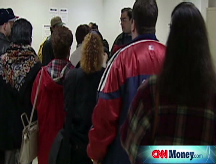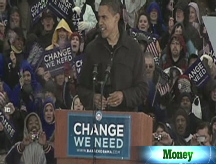It will be hard to create jobs
Unemployment is likely to rise during the first year of Obama's term, no matter what steps he takes.
 |
| Economists say there are limits to what President-elect Obama can do to stop job losses during his first year in office. |
NEW YORK (CNNMoney.com) -- Here's the challenge facing President-elect Barack Obama as he weighs how to create more jobs: another half-million jobs likely will be lost between now and Inauguration Day.
That's not even counting the 200,000 jobs that economists believe employers trimmed last month, according to estimates from Briefing.com. The October jobs report will be released this Friday.
The unemployment rate is expected to climb to 6.3% from 6.1% and match the worst reading of the decade. And economists all seem to agree the worst is yet to come.
At some point next year the unemployment rate is forecast to pass 7%, a level not seen since 1993.
And monthly job losses of 200,000 or more are expected to become the norm, not the exception, as the full impact of the credit crisis is felt more keenly on Main Street.
Economists generally believe there's little Obama can do to stop more job losses in the short-term, even if he's able to get a new economic stimulus package passed by the lame-duck Congress and signed into law by President Bush.
"Superman couldn't change what's in store for the U.S. economy. It's going to be ugly," said Rich Yamarone, director of economic research at Argus Research.
Andrew Reina, a practice director for the staffing firm Ajilon Finance Solutions, said caution has become the watchword for companies making hiring decisions because of uncertainty about business conditions.
Even if they aren't cutting jobs, they're likely leaving more positions open this year and could push back hiring plans for 2009 until later in the year. Reina agrees that President-elect Obama won't be able to change that outlook in the near term.
"It's an uphill battle. He's going to have a lot of work on his hands early on," he said.
One of the immediate questions facing the Obama administration is what help, if any, to extend to the battered U.S. automakers, who may seek the same kind of financial help that banks and Wall Street firms have received recently. General Motors (GM, Fortune 500) issued a statement Wednesday suggesting it is looking forward to that kind of help from that the new administration.
"GM welcomes President-elect Obama's pledge to support our nation's domestic auto industry in its ongoing efforts to transform its business and develop new technologies," the company said. "This support will enable a competitive U.S. industry to contribute significantly to our nation's economic revival."
The Center for Automotive Research, a Michigan think tank, issued a study Wednesday that showed 2.5 million jobs could be lost in the next year if GM, Ford Motor (F, Fortune 500) and Chrysler were forced by the downturn to shutdown half of their U.S. plants.
"To permit any of the Detroit Three manufacturers to collapse would scar the U.S. economy further at a time when it can ill afford another blow," said David Cole, CAR's chairman. "The likelihood of one or two of the Detroit Three manufacturers ending operations is very real."
But many of those plants could be lost even if government help is made available, especially if auto sales stay weak and credit to car buyers and dealers remain tight.
Along those lines, experts say that worries about the economy, not necessarily policy changes from Obama, will keep employers from adding staff. Even those who expect some kind of stimulus plan getting past Congress say more job losses are already certain.
"I think businesses are going to do what they're going to do, regardless of government policy, at least over the next six months," said Mark Zandi, chief economist of Moody's Economy.com, who forecasts job losses between 150,000 and 200,000 a month over the next six months.
Another economist suggested that the positive effects from a stimulus package would not be felt until spring or early summer 2009 at the earliest and that there would be no significant job gains until 2010.
"Classically, employment is a lagging indicator that will decline well into the recovery period," Brian Bethune chief U.S. financial economist for research firm Global Insight. "Assuming the recession lasts until middle of 2009, it may be another six to eight beyond that before employment stabilizes."
This doesn't mean that Obama is powerless to help create jobs for the longer-term. And economists say things could be worse if the new administration makes the wrong decisions.
Mark Vitner, senior economist with Wachovia, said unemployment could rise as high as 8.5% in the first quarter of 2010 if Congress does approve help for state and local governments and move ahead on public works projects as part of a stimulus package.
Vitner also is worried that employers will pull back on hiring even more if they sense that an Obama administration will make it easier for unions to organize non-union companies.
But he doesn't believe either Obama or the congressional Democrats will actually push an anti-business agenda.
Much of the current job weakness stems from credit tightening, which makes it more difficult for large and small businesses to get the financing they need to expand and hire more workers.
But Vitner said there is relatively little that either Obama or the current Bush administration will be able to do to get banks and Wall Street firms lending again, despite talk about pushing financial institutions to use the $700 billion in federal help to start making loans.
"Banks will continue to tighten until we see an improvement in credit quality. That's 18 months to two years away," Vitner said. "The credit cycle has to play out. You can't legislate lending." ![]()



